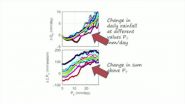(Press-News.org) EUGENE, Ore. -- (Sept. 16, 2015) -- New research at the University of Oregon finds that an organization's logo on a food product can trigger quick perceptions by consumers about an item's healthiness and influence their decision-making.
That perception also may be seen as an endorsement that may not exist, say study co-authors Elizabeth Minton of the University of Wyoming and T. Bettina Cornwell, the Edwin E. & June Woldt Cone Professor of Marketing in the Lundquist College of Business at the UO.
The research, led by Minton as part of her doctoral dissertation at the UO, probed alliances of organizations through the placement of logos on mock food products. The findings are timely.
Earlier this year Kraft Foods Inc. and the Academy of Nutrition and Dietetics agreed on a deal in which the company would support research and public awareness campaigns on the importance of calcium and vitamin D in exchange for using the academy's "Kids Eat Right" logo on its packages of Kraft Singles. The deal quickly was canceled amid a backlash about potential misperceptions about the healthfulness of highly processed foods.
"There has been fear about false perceptions of endorsement by charities and other partners when aligned with unhealthy food. That probably, while real, is less worrisome than the simple misperception that a food is more healthy," Cornwell said. "If consumers are pondering an endorsement claim, at least they are thinking about their choice, but if a quick look at a package directly influences food perception it has passed that cognitive filter."
The findings, published online ahead of print in the Journal of Consumer Affairs, involved a pre-test followed by three experiments that added different levels of complexity.
The pre-test, with 291 undergraduate business students, laid the experimental foundation. It explored quickly formed associations made by the participants of the healthiness of two food products, cookies and crackers, along with underlying values of three causes, the American Heart Association, World Wildlife Fund and Goodwill.
The American Heart Association (health cause) was associated with health and heart. The World Wildlife Fund (environmental cause) was most-often linked to animals and nature, and Goodwill (social cause) was associated with cheap and donations. The health cause related to food and generated health associations. Environmental and social causes, when paired with food products, generated no health associations.
In experiment one, 109 undergraduate business students saw simple packages of cookies that displayed a cause logo and a name, either Goodwill or the American Heart Association, along with information that a purchase would lead to a donation. Participants believed the cookies partnered with the AHA to be a healthier choice than cookies with no cause or those partnered with Goodwill.
These findings, the researchers say, are alarming since consumer perceptions of the healthiness of a food changed with the cause logo on the package.
The second experiment, with 140 undergraduate business students, tested the idea that cause-related marketing increases consumer attitudes or intentions to purchase, in this case, crackers. The AHA logo moved the participants' thinking toward choosing the product for health reasons. The World Health Fund and Goodwill logos also worked because the causes were deemed worthy, but they did not increase health perceptions.
The third study -- done with 120 adults recruited by way of Amazon's online crowd-sourcing Mechanical Turk -- used a food-related but non-health charity cause, Meals on Wheels, as its focal point to probe if health perceptions, intentions or attitudes influence a decision to purchase, again, crackers.
This scenario leveled the playing field related to amounts of information about a cause included on the packaging and, working with adults, allowed the researchers to adjust for higher levels of product and cause knowledge that older participants brought to the testing.
In the end, Minton and Cornwell found that the pairing of Meals on Wheels on the crackers' packaging, with wording about the cause, slightly enhanced perceptions that crackers are a healthy choice. That connection, the research found, is based on quick judgments that may or may not touch the assumption of an endorsement.
"Cause marketing can influence consumer food product evaluations when cause cues are integrated within food packaging," Minton said. "Our findings build upon prior research that has shown that corporate social responsibility efforts generally influence food product evaluations."
There are take-home messages for both consumers and marketers, Cornwell said.
"From a consumer perspective, it is worthwhile to pause a moment to take the time to consider just what additional communications on packaging might mean," she said. "Marketers should be concerned about the potential for any unintended meanings from their products, packaging and marketing communications. They should want to avoid misleading consumers by taking the time to look ahead about what such a relationship might communicate."
INFORMATION:
Sources: T. Bettina Cornwell, Edwin E. & June Woldt Cone Professor of Marketing, 541-346-8241, tbc@uoregon.edu; and Elizabeth Minton, Assistant Professor of Marketing, University of Wyoming, 307-766-3616, eminton@uwyo.edu
Note: The UO is equipped with an on-campus television studio with a point-of-origin Vyvx connection, which provides broadcast-quality video to networks worldwide via fiber optic network. There also is video access to satellite uplink and audio access to an ISDN codec for broadcast-quality radio interviews.
Links:
Paper (abstract): http://onlinelibrary.wiley.com/doi/10.1111/joca.12091/abstract
Cornwell faculty page: https://business.uoregon.edu/faculty/t-bettina-cornwell
Minton faculty page: http://www.uwyo.edu/mgtmkt/faculty-staff/faculty-pages/minton.html
TORONTO [11 September 2015] A team of astronomers has given us our best view yet of an exoplanet moving in its orbit around a distant star. A series of images captured between November 2013 to April 2015 shows the exoplanet β Pic b as it moves through 1 ½ years of its 22-year orbital period.
First discovered in 2008, β Pic b is a gas giant planet ten to twelve times the mass of Jupiter, with an orbit roughly the diameter of Saturn's. It is part of the dynamic and complex system of the star β Pictoris which lies over 60 light-years from Earth. The ...
The use of antidepressants during pregnancy has no long term neurodevelopmental or behavioural effects on the child, however they may be associated with an increased risk of postpartum haemorrhage, suggests the findings from three studies published in BJOG: An International Journal of Obstetrics and Gynaecology (BJOG).
Depression and anxiety are the most common mental health problems during pregnancy, with around 12% of women in the UK experiencing depression at some point during pregnancy and the postnatal period. The use of antidepressants such as selective serotonin ...
Stanford University School of Medicine researchers and their colleagues are calling for an urgent re-evaluation of global guidelines for the treatment of parasitic-worm diseases in light of a new study showing that large-scale treatment programs are highly cost-effective.
Parasitic-worm diseases afflict some 1.5 billion people in the developing world, causing gastrointestinal problems, anemia, wasting, and cognitive and growth deficits in children, and in some cases, liver, bladder and intestinal problems that can be fatal. About 150,000 people die of complications from ...
CANCER RESEARCH UK scientists have found how cells adapt to overcome cancer drugs designed to interfere with their genetic controls, according to a study* published today (Wednesday) in Epigenetics and Chromatin.
Normally molecular 'tags' are attached to DNA which send signals to the cell, telling it how to package its DNA and switch genes on or off.
Drugs called HDAC inhibitors cause a build-up of certain types of tags, leading to potentially damaging changes in gene activity that can kill cancer cells.
But while HDAC inhibitors can successfully treat certain types ...
An accidental find of a collection of young red dwarf stars close to our solar system could give us a rare glimpse of slow-motion planet formation.
Astronomers from The Australian National University (ANU) and UNSW Canberra found large discs of dust around two of the stars, tell-tale signs of planets in the process of forming.
"We think the Earth and all the other planets formed from discs like these so it is fascinating to see a potential new solar system evolving," said the lead researcher Dr Simon Murphy, from the ANU Research School of Astronomy and Astrophysics.
"However, ...
New research at the University of Warwick with colleagues from the London School of Economics has identified changes in the shape of rainfall across Europe; changes in the amount of drizzle compared with downpours and everything in-between.
Professor Sandra Chapman of the University of Warwick and co-authors Professor Nicholas Watkins and Dr David Stainforth from the London School of Economics have today published new research demonstrating how the variability in the way it rains makes it intrinsically difficult to identify the character of local climate change. Difficult ...
HANOVER, N.H. - Warming temperatures are causing Arctic mosquitoes to grow faster and emerge earlier, significantly boosting their population and threatening the caribou they feast on, a Dartmouth College study finds.
The study predicts the mosquitoes' probability of surviving and emerging as adults will increase by more than 50 percent if Arctic temperatures rise 2 °C. The findings are important because changes in the timing and intensity of their emergence affect their role as swarming pests of people and wildlife, as pollinators of tundra plants and as food for ...
A total ban on trans fatty acids (trans fats) in processed foods in England could potentially prevent or postpone about 7,200 deaths from coronary heart disease over the next five years, suggest experts in The BMJ this week.
They say a total ban in England is "technically feasible" and they call for "decisive action" to prioritise the most effective and cost effective policy options.
Industrial trans fatty acids are produced from plant oils (a process known as hydrogenation) and are commonly added to processed foods to cheaply improve shelf life and palatability.
Higher ...
Public Health England (PHE) recently endorsed the use of electronic cigarettes as an aid to quitting smoking. But in The BMJ this week, experts question the evidence on safety and effectiveness underpinning the recommendations.
Professor Martin McKee at the London School of Hygiene & Tropical Medicine and Professor Simon Capewell at the University of Liverpool, argue that the available evidence about e-cigarettes "suggests that the debate is far from over and questions remain about their benefits and harms."
The PHE report concludes that e-cigarettes are much safer ...
The reason why middle class people are more likely to play music, paint and act has been revealed in a major new study.
Research involving 78,000 people found that it was not wealth or social status that were strongly linked to people taking part in arts activities as amateurs or professionals.
Instead, it was the level of education that lay behind arts participation, the study by Dr Aaron Reeves, a sociologist at the University of Oxford, found.
In an article in the journal Sociology, Dr Reeves said that of the 78,011 surveyed, 18% had taken part in painting or ...



